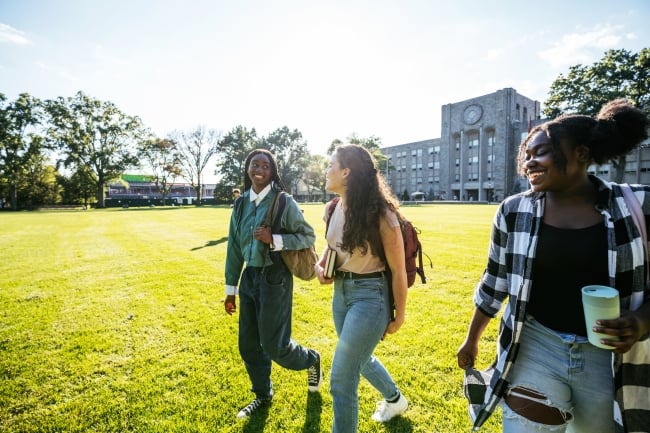You have /5 articles left.
Sign up for a free account or log in.

A student’s feelings of belonging in the classroom and on campus are tied to their academic outcomes, plus graduation rates and mental health, according to a new brief.
Drazen/E+/Getty Images
Despite colleges and universities enrolling more diverse student populations now than ever before, there continue to be inequities in completion and retention.
Belonging and student experience are two key factors to student retention and completion, particularly for students from historically minoritized backgrounds, and investing in these kinds of interventions can help them get across the finish line, says Diane Cheng, vice president of research and policy at the Institute for Higher Education Policy.
A new brief from IHEP highlights belonging and student experience–focused interventions with proven outcomes in aiding academic achievement, supporting student mental health and promoting completion of postsecondary degrees.
Across the institution: A student’s sense of belonging is their sense of being connected, academically and socially, to their community, according to the report. The student experience, or the day-to-day experiences students have on campus and with the institution, can include interactions and communications between instructors, administrators, staff and peers.
Prior research shows the value of belonging in student retention, engagement and graduation, and this is particularly true for students from historically minoritized backgrounds who may face additional barriers to connection, community and positive experiences on campus.
Often, belonging interventions are implemented at the institutional level, but the work can be supported by federal policymakers, Cheng says. This can be done by providing institutions with the resources to scale and evaluate initiatives through the Post-Secondary Student Success Grant or by implementing the Postsecondary Student Success Recognition program.
“Completion is an important stepping-stone to postsecondary outcomes,” Cheng says.
In the classroom: As a faculty member at the University of New Mexico, Sushilla Knottenbelt has seen how a focus on belonging and students’ experiences improve learning, engagement and motivation among her students.
Since shifting practices to be more student-focused, Knottenbelt has seen higher levels of engagement from her students in asking course-related questions and seeking help, and she’s experienced more interpersonal connection with learners.
“Teaching in a way that pays attention to the student experience connects you to the students in a fundamental way that speaks to the human experience,” says Knottenbelt, a professor of chemistry and biochemistry.
Additionally, in her introductory general chemistry courses, Knottenbelt is able to cover more material and introduce more concepts than ever before, which she attributes to creating a culture of growth that elevates the impact of her active teaching and other pedagogical strategies.
“The focus on belonging and mindset, for me, has allowed me to set the environment where all those other practices can be effective,” Knottenbelt says.
Students are also generally receptive to the belonging interventions, and these habits carry with them from one course to another, helping them persist throughout their time at the university.
The how-to: To promote student success, according to Cheng and Knottenbelt, higher education practitioners and administrators can:
- Rephrase language around academic probation. Students who hold a 2.0 GPA or lower are often placed on academic probation, which may cause them to stop out or not finish their degree program. Colleges that changed communication and messaging around academic probation saw students were more likely to improve their grades and stay enrolled, compared to their peers who received traditional messages. Language can also be modified in the faculty handbook to focus more on recovery and growth than failure and success.
- Promote a growth mindset among learners. Professors and support staff can impact students’ self-perceptions and encourage learning by providing education around growth mindset and how failure is related to learning. Normalizing challenges and helping students see college-level courses are intrinsically difficult are two ways to do this. A study from Washington State University found email communication that encourages a growth mindset and learning skills helped first-generation students earn higher grades.
- Encourage at-risk students. Knottenbelt will email students who are not on track to pass her class to encourage them to try again in the next term, recognizing many of them faced extenuating circumstances that hindered their academics. In her emails, Knottenbelt encourages students to reach out to identify success strategies for the next time they take the course.
- Demystify the hidden curricula of higher education. For first-generation students, in particular, confusing language can impact their retention and success because it is difficult to navigate institutional structures and receive support. Campus leaders should work to decode academic processes to improve students’ feelings of belonging and inclusion.
- Reduce bureaucracy in processes. Streamlining processes such as how to access financial aid or register for courses can also promote retention among college students because they are not facing additional barriers to access.
- Create a community of practice. Administrators should facilitate spaces for faculty and staff members to meet, discuss ideas and work to solve problems together, allowing personnel to learn and reflect among peers. This work could be centered on pedagogy or larger institutional strategies such as data.
Many of these actions involve limited resources and can be applied to a variety of institution types and instruction delivery method. The Student Experience Project also offers resources for faculty members interested in this work, many of them low-lift, Knottenbelt says.
Join a community of higher education leaders and practitioners supporting student success in person this fall. Register for Student Success US here.








